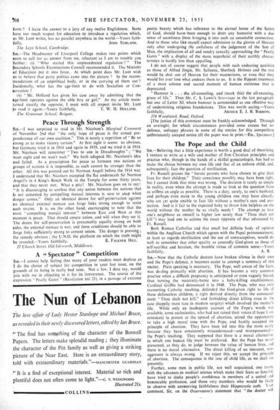Peace Through Strength SIR,—I, was surprised to read in Mr.
Nicolson's Marginal Comment of November 2nd that " the only hope of peace is the armed pre- ponderance of our own coalition." This is surely a repetition of " Be so strong as to make victory certain." At first sight it seems so obvious, but Germany tried it in 1914 and again in 1939, and we tried it in 1914. Mr. Nicolson will remember " Two to one in Dreadnoughts" ; "We Want eight and we won't wait." We both adopted Mr. Nicolson's idea and failed. As a prescription for peace as between two nations or groups of nations it is impossible, as each cannot be stronger than the other. All this was pointed out by Norman Angell before the 1914 war. I understand that Mr. Nicolson occupied the flat underneath Sir Norman Angell's in 4 King's Bench Walk in the Temple for some thirty years, and that they never met. What a pity! Mr. Nicolson goes on to say: " It is discouraging to confess that any union between the nations that is not cemented by compelling Mutual interests is sure to snap when danger comes." Only an identical desire for self-preservation against an identical external menace can forge links strong enough to resist such strains. It is, on the other hand, encouraging to note that the most " compelling mutual interest " between East and West at this moment is peace. That should ensure union, and will when they see it. The desire for self-preservation is presumably equally strong on both sides, the external menace is war, and these conditions should be able to forge links sufficiently strong to cement union. The danger is pressing ; the remedy obvious ; the U.N.O. the platform on which the truth might
57 Church Street, Old Isleworth, Middlesex.


































 Previous page
Previous page